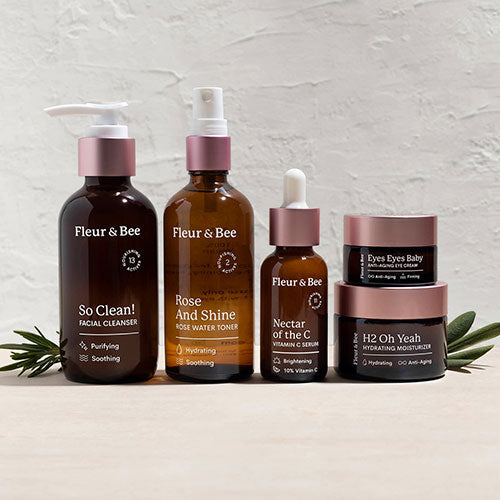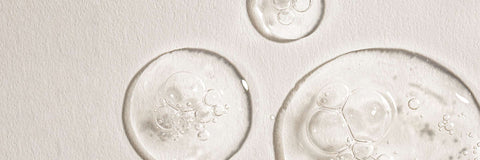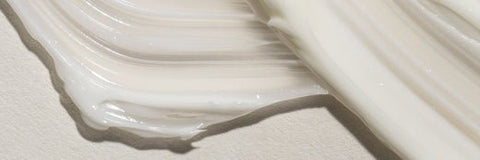Sensitive skin is no walk in the park. Whether it’s redness from the sun, irritation from skin care products or environmental allergens, or a scaly surface due to excessive dryness — there can be a lot of unpleasantness that goes along with increased sensitivity.
For those with sensitive skin, taking care of your epidermis is more complicated than grabbing random products off a drugstore shelf. The key is learning which ingredients do and don’t work for your skin’s unique needs.
Let’s just say your skin has high standards!
For those of you looking for help with sensitive skin care, this is your guide on how best to take care of your body’s largest organ. Read on for more info about sensitive skin care, or watch the below video.
IN A NUTSHELL
Main Takeaways: If you have sensitive skin, you need to be extra careful with the products you use. Avoid common irritants like artificial fragrance, parabens, and sulfates, and use gentle products designed for sensitive skin.
Good to Know: Some people are born with sensitive skin, but it can happen to anyone at any time, particularly as you age or if you move to a new climate.
Recommended Products: Just Dew It Hydrating Serum, H2 Oh Yeah Hydrating Moisturizer, Crème de la Cream Brightening Moisturizer, and sunscreen.
What Causes Sensitive Skin?
Sensitive skin can be caused by a whole host of factors. It could be something you’ve dealt with your entire life — or a newer condition caused by external circumstances or lifestyle factors.
Moving to a completely different climate (from beach to desert, for example) can cause your skin to become more sensitive.
Sensitive skin can easily be triggered or based on the following factors:
- Genetics — If your parents (or grandparents) had sensitive skin, it’s more likely that you do, too. Even specific factors like sun sensitivity can be passed down via your DNA.
- Age — As you get older, your skin changes. You may experience more dryness, and your skin becomes thinner, which means it can be more easily affected. In addition, cumulative sun exposure can damage the skin, making it more sensitive.
- Environmental exposure — Severe weather (heat, cold, and strong winds), environmental toxins and products, and pollution can all contribute to skin issues and increased sensitivity.
- Ethnicity — Your ethnic background, skin color, and heredity can all influence the way your skin reacts to certain factors. Different skin colors, for example, are prone to different issues, from sunspots to hyperpigmentation.
- Skin care products — Using skin care products with toxins or other harsh ingredients can cause your skin to become more sensitive or trigger flare ups.
- Lifestyle factors — Eating foods high in salt and/or fat, drinking alcohol in excess, smoking cigarettes, consuming chemicals, not getting enough exercise, and excessive stress are all factors that can affect the quality and sensitivity of your skin.
Sensitive Skin Symptoms
So how do you know if you have sensitive skin?
For those with sensitive skin, it’s common to experience one or more of the following:
- Frequent flushing or redness
- Tingling or irritation
- Ongoing dryness
- Skin bumps or other reactions
- Itchiness
- General discomfort
If you have sensitive skin, it’s likely you’ve had some of the above symptoms. Your skin may get easily red when you do anything outdoors, and certain products may make it tingle or react, or you might live in a humid climate and still suffer from excessive dryness.
Remember to consult with a dermatologist if you’re suffering from any serious skin issues or suspect you have a specific condition or allergy.

Tips for Sensitive Skin Care
Here’s how to take care of sensitive skin, in a nutshell:
- Avoid harsh soaps with deodorants and fragrances. Artificial fragrances are known for causing reactions in sensitive skin. It’s easy to spot these ingredients — just look for the word “fragrance” on labels. Instead, opt for products with natural scents like essential oils and flower essences.
- Skip the toxins. Unfortunately, many common skin care products contain toxins in the guise of “helpful” ingredients. Label reading is particularly important when your skin is sensitive. Some of the key ingredients to avoid include parabens, sodium lauryl sulfates (SLS), phthalates, oxybenzone, lead, aluminum, triclosan, polyethylene glycols (PEGs), and hydroquinone.
- Check for hard water. If your tap water is “hard” (meaning it contains minerals like calcium, magnesium and iron), it can seriously dry out your skin and even clog pores. If your soap doesn’t lather well, you feel a residue on your skin (and shower), your hair is flat, or your water pressure is low, these are all potential signs that you have hard water. You can buy tests online to be sure; if you get a positive result, consider installing a water softener in your home.

Best Skin Care Products for Sensitive Skin: How to Create a Routine for Sensitive Skin
Now that you know what not to do, let’s talk about how to develop a daily skin care routine for sensitive skin that meets your needs.
Trial and error is definitely part of the process– what soothes and nourishes some skin may irritate others.
Here are some sensitive skin care tips that can help you create your routine.
Always Use a Moisturizer
Moisturizer is a key component when it comes to sensitive skin care. The proper natural moisturizer will help to protect and nourish your skin, and retain moisture so you’re more resistant to dryness and irritation. Look for ingredients that will protect your skin with antioxidants, as well as soothe and calm your skin (i.e. aloe & shea butter.) H2 Oh Yeah is ideal for dry, sensitive skin and combines shea butter with antioxidant-rich sea buckthorn oil to deeply hydrate.
Crème de la Cream as designed to gently moisturize with aloe while brightening and protecting your skin with antioxidants vitamin C and green tea.
Never Skip Sunscreen
Sunscreen is mandatory! UV rays are incredibly damaging to all skin types, causing sunspots, dryness, premature aging, and a whole host of other potential issues. Choose the right sunscreen and slather it on every morning. Remember to re-apply per the label instructions.
Keep Your Skin Well Hydrated
Sensitive skin is often prone to inflammation and irritation, leaving the top layer of your skin exposed and can easily dry out and become dehydrated. Restore much needed hydration to your skin both internally (drink plenty of water!) and externally with a hydrating serum. Just Dew It is armed with hyaluronic acid, aloe and antioxidant and vitamin rich oils to draw water into your skin for an instant glow.
Protect Yourself Against the Elements
If you enjoy the outdoors make sure to protect your epidermis. Anytime you’re headed out on an adventure, wear a hat, long pants/sleeves, or any other gear you need to shield yourself from excessive wind and UV rays. If you’re into swimming, salt and/or chlorine can irritate your skin, so always wear sunscreen, moisturize well, and be sure shower immediately after exposure.
Skip Super-hot Water
While a hot shower might be a nice treat every once in a while, it’s best to stick with lukewarm or cooler water — particularly when washing your face. Try to get used to lower temps for your shower or bath. Your hair and skin will thank you for it.
Do Your Routine Morning and Night
We recommend a twice daily basic routine for sensitive skin to keep it in its best possible shape. First, use a natural cleanser. Next, a rosewater toner followed by an eye cream, a vitamin c serum and a moisturizer. Add sunscreen to the mix in the morning. That’s it! While you may need to experiment with a few different products, Fleur & Bee’s 5-Step Deluxe Skincare Set was designed with sensitive skin in mind and uses botanical ingredients known to nourish and soothe.
Frequently Asked Questions About Sensitive Skin
What Causes Sensitive Skin?
Sensitive skin can be caused by hormones, age, severe weather, pollution, genetics, or allergies. Some of these you can’t change, but it is important to always cleanse your face and moisturize twice a day using products that don’t contain common irritants like parabens, sulfates, or artificial fragrances.
Getting plenty of sleep and exercise and limiting alcohol consumption is also beneficial for those with sensitive skin. If you still experience sensitivity, you may want to consult a dermatologist who can help you pinpoint the issue.
What are the Symptoms of Sensitive Skin?
The symptoms of sensitive skin can vary dramatically from person to person; and depending on how sensitive a person is, vary even with that one person. From redness to irritation, bumps to itchiness, dryness to a general feeling of discomfort– these are all symptoms of sensitive skin.
How To Deal With Sensitive Skin?
The best way to deal with sensitive skin is to establish a skin care routine with natural products that are created for sensitive skin. Stick with products without chemicals or artificial fragrances that could irritate the skin. Ingredients you should stay away from include; parabens, sodium lauryl sulfates (SLS), phthalates, oxybenzone, lead, aluminum, triclosan, polyethylene glycols (PEGs), and hydroquinone.
Avoid extreme temperatures; this includes lowering the water temperature in your shower. Make sure you get enough sleep, water, and exercise, and see your dermatologist regularly. Talking through your skin care routine or lifestyle routine (or just going over your medical history) with your derm might yield some clues as to why your skin has a tendency to act up.
What Are the Best Products for Sensitive Skin?
More than anything, if you have sensitive skin, you’ll want to make sure the products you’re using contain no known irritants like harsh chemicals (we’re looking at you, parabens) or artificial fragrances. Clean, plant-based skincare is ideal for many with sensitive skin, as they are free of toxins, safe for most skin types, and have transparent labeling of ingredients.












